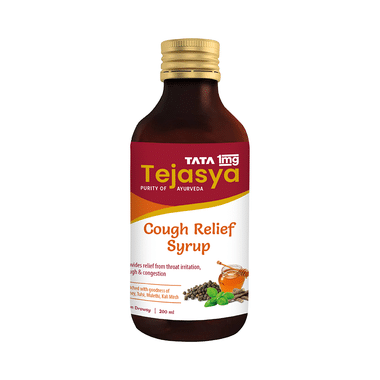Rs. 125
Rs. 195
36% off
Available in other variants

Product Details
Tata 1mg Tejasya Cough Relief Syrup is an ayurvedic remedy for cough and congestion. It is a honey-based formula enriched with tusli, mulethi, sonth, kali mirch, and pipali etc. This cough syrup helps relieve allergic cough, bronchitis, congestion, and throat irritation. It is non-drowsy and alcohol-free. This herbal remedy has antibacterial and anti-inflammatory properties, which help deal with cough, nasal congestion, and throat irritation.
Key Ingredients:
- Madhu (Honey): Helps deal with a dry and wet cough
- Tulsi (Ocimum Sanctum) Leaf Extract: Helps soothe the respiratory tract
- Mulethi (Glycyrrhiza Glabra) Root Extract: Helps soothe the throat
- Kali Mirch (Piper Nigrum) Fruit Extract: Suitable for throat irritation
- Sonth (Zingiber Ocinale) Root Extract: Helps reduce mucus production
- Pipali (Piper Longum) Fruit Extract: Helps manage asthma and bronchitis
- Vasa (Adhatoda Vasica) Leaves Extract: Helps manage lungs disorder
- Kakadasingi (Pistacia Integerrima) Gall Extract: Helps clean respiratory tract
- Dalchini (Cinnamomum Zeylanicum) Stem Extract: Helps relieve cough
Key Benefits:
- This honey-based formula provides relief from cough and congestion
- It also helps provide relief from allergic cough, bronchitis
- It is effective against sore throat and cold
- It is enriched with honey, tulsi, mulethi, kali mirch and other ayurvedic herbs
- This alcohol-free formula is non-drowsy
Directions For Use:
10 ml daily twice or as directed by your healthcare consultant.
Safety Information:
- Store in a cool and dry place, away from direct sunlight
- Keep out of reach of children. Keep the container tightly closed
- Do not use it if the seal is broken
- Read the label carefully before use












